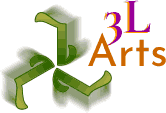Getting From Here to There
Updated: May 7, 2024
When I tell you the inspiration for "Rainforest Abstraction" was a pair of macaws and Southwestern Native American pottery, you may say,"Huh?"

Here is the image I used as my starting point for inspiration.

The colors of the birds and the foliage informed my initial color choices when selecting from my collection of stone and glass beads and already-cured polymer clay tiles as well as in creating new clay tiles. Patterns and textures in many of the tiles brought to mind feathers.
The rubber stamp I used to make the tile in the lower right spoke to me of the human cultures living alongside these birds in their natural habitat.

That was also the case for the gold focal piece: one of a favorite pair of pre-Columbian replica earrings I purchased when I lived in Ecuador.
I didn't want to be too direct in my use of bird motifs although the four teardrop elements in the upper left do pretty obviously recall a crown of feathers and the adjacent curved element is very beak-like.

The oblong, off-white beads also reminded me of parrots' beaks.

By the time I made these decisions I had put away my reference photo--precisely to avoid being too literal--and had forgotten that the birds' beaks are actually black!
I also wanted to move away from the completely rectilinear patterning in my earlier wall mosaics. I was inspired to continue the spiral pattern from the "beak" tile and around the gold focal by the highly stylized parrot designs used on Hopi pottery familiar to me from my years working at the Arizona State Museum.

